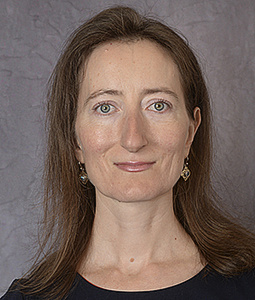Department of Physics and Astronomy
Faculty and Staff Directory
Yordanka Ilieva
| Title: | Professor Research Interest: Experimental Nuclear Physics |
| Department: | Physics and Astronomy McCausland College of Arts and Sciences |
| Email: | ilieva@sc.edu |
| Phone: | 803-777-2887 |
| Office: | Jones PSC, Room 706C |
| Resources: | Curriculum Vitae [pdf] |

Research Focus
Although ninety-eight percent of the mass of ordinary matter is due to the strong
subatomic force,
the present theory of that force (Quantum Chromodynamics) is still not fully understood.
Almost
the entire mass of an atom is concentrated in its tiny nucleus, which is made of nucleons
that are
either positively charged (protons) or electrically neutral (neutrons). These subatomic
particles,
however, are not elementary but are themselves composite objects made of quarks held
together
by glue particles (gluons). The structure of nucleons is a manifestation of the strong
force, which
is indeed the strongest force known. The core of Prof. Ilieva’s research is the study
of the strong
force by probing the substructure of matter. Her research activities help to address
overarching
questions about the origin of most of the visible mass in the universe, the nature
of neutron stars,
and the gluonic structure of nucleons and light nuclei. Answering these and related
questions is a
complex task requiring dedicated experimental observations and careful testing of
theoretical
predictions against measured observations. Professor Ilieva’s research also promotes
teaching,
training, and learning. The preparation of junior scientists plays a central role
in her program.
The nuclear physics research program of Professor Ilieva is primarily based at the
Thomas Jefferson
National Accelerator Facility (JLab) in Newport News, where she uses high-energy electron
and
photon beams along with sophisticated particle detectors as powerful microscopes to
study the
structure and interaction of baryons. Her program provides crucial high-precision,
polarized and
unpolarized photo-production observables that will help pin down present problems
in strong
QCD. For example, complete and mostly complete meson-photoproduction measurements
will
settle in an almost model-independent way lingering problems in baryon spectroscopy
and in
particular verify the SU(6)xO(3) three quark baryon structure. The structure of baryons
can be
also probed through their interactions in scattering processes. The study of strong
interactions
involving the strange and the charm quarks is essential to understand the properties
of neutron
stars and the gluonic structure of bound nucleons and light nuclei, respectively.
Professor Ilieva
carries a comprehensive study of hyperon photo-production off deuterons. The extensive
set of
single- and double-polarization observables will provide long-needed experimental
information
on the hyperon-nucleon interaction. At the recently upgraded 12-GeV JLab, she carries
out a
program on J/psi photoproduction off deuteron. This research will provide the very
first crosssection
estimates at energies close to threshold. Another aspect of her research is to support
the
detector development for a future Electron-Ion Collider in the U.S. She carries out
an assessment
of the performance of commercially available small photosensors in high magnetic fields
in her
test facility at Jefferson Lab.